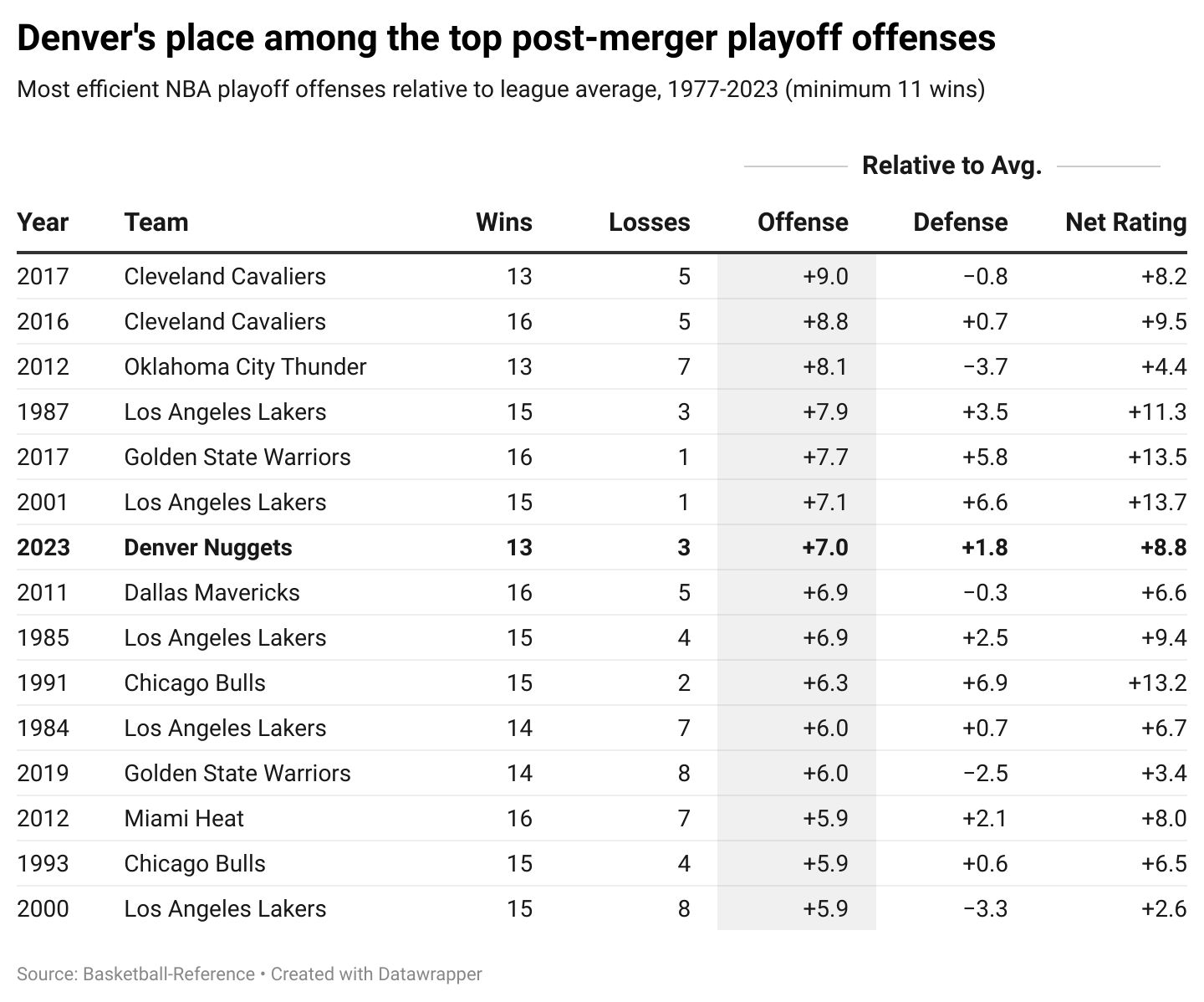The Nuggets' Offense Has No Bad Options
Practically every member of Denver's rotation has been hyper-efficient in these playoffs.
Playing Game 1 of the NBA Finals at home, the Denver Nuggets did what was expected of them against the Miami Heat on Thursday night — cruising to victory in a contest that was seldom within single-digits in the second half. What’s scary, though, is that it didn’t even represent the best Denver is capable of. While their defense shined, holding Miami to its worst offensive rating of the playoffs, the Nuggets’ offense had a pretty “ordinary” night by its standards.
Yes, Nikola Jokić had 27 points on 67% shooting with 14 assists, and yes, Denver’s offensive rating of 114.4 in the game was nearly a full point better than the playoff average leaguewide. But it was also Denver’s fifth-least efficient outing of the postseason to date, and one of their worst in roughly a month. That’s just how dangerous these Nuggets are — and why they’re a threat to scorch the Heat even worse over the rest of the series.
Statistically, this is among the most lethal offenses in post-merger NBA playoff history. Denver’s offensive rating of 120.6 is the highest in a postseason by any team with at least 11 wins (the number it took to make the Finals at the dawn of the 16-team playoff era), and while the NBA’s average rating is unusually high this postseason, they still have the seventh-best offense of the modern era relative to average when we adjust for the changing league baseline.
That’s the big-picture case for Jokić, Jamal Murray and Co. being on the shortlist of all-time efficient playoff offenses. What sets them apart from the rest, however, is just how efficient each of the team’s component parts is.
We all know Jokić is one of the most uniquely productive players in NBA history, capable of defying any previous notions about a trade-off between usage and efficiency. (Only two seasons in history have seen a player produce an individual offensive rating of 130+ with a usage rate of at least 27%; Jokić owns both of them.) But he is just one piece of Denver’s wildly efficient puzzle. Between Murray (122), Jokić (130), Aaron Gordon (124), Michael Porter Jr. (122), Kentavious Caldwell-Pope (122) and Bruce Brown (123), six different Nuggets regulars1 boast an offensive rating of at least 120 this postseason.
In other words, each and every one of those guys generates more than 120 points for every 100 possessions they use — buying points at a better exchange rate than the 1996 Bulls, or the 2017 Warriors, or any other legendary ensemble you can think of. That’s absurd!
Again, this is a particularly high-efficiency postseason in a particularly high-efficiency era of the sport. But even if we account for that, those six Nuggets are all producing at a rate well in excess of 7 points per 100 possessions above the NBA average. No other playoff team since the merger has had more than five rotation players (qualifying with 10+ games and 20+ MPG) surpass the league average by 5 points per 100. Denver’s lineup is blowing past both of those benchmarks.
And that’s part of what makes the Nuggets so tough to beat. Yes, most of their action is driven by Murray and Jokić, the only two members of that group with a usage rate over 20%. But no matter whether they keep it themselves or pass it off to somebody else, pretty much everyone on the court for Denver is deadly every time they touch the ball.
The ease with which Denver dominated Game 1 might be mitigated some when Miami gets acclimated to the thin mountain air, and further so when the Finals shift back to South Florida. But one thing the Heat will have to contend with all series long is the fact that there are way too many Nuggets who can hurt you. Any choice you make to stop one of them will just put the ball in the hands of someone equally deadly.
Filed under: NBA
With 20+ minutes per game.








I think the Heat fans appreciate the jinx you laid on Denver here. 😂